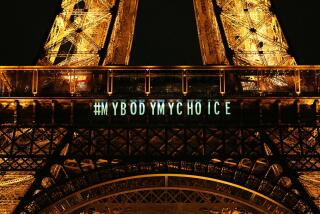Sarkozy ready to battle the unions
PARIS — The man the French call the “hyper-president” has just gone into warp speed in his drive to change the country.
Since he was elected in May, Nicolas Sarkozy has been barreling ahead on his plan to reinvent practically every aspect of French society, ascending so many podiums, appearing so relentlessly with new ideas at public forums from Bordeaux to Brussels, that a French magazine recently demanded the media have a “Sarkozy-Free Day.”
Pas de chance.
After spending the previous two days courting union leaders, he took time last Monday to muse about a French architectural renaissance. Then, on Tuesday, he picked his first fight, with the unionized workers of the public sector. On Wednesday, he was out to slash civil service jobs, and by Thursday there was more talk of social reform and three television appearances to pitch it.
No program is too small, no detail too insignificant for the new man running the Elysee Palace. In fact, a popular comedy segment on French TV has a recurring joke with a panicked husband calling the show every night to report that his wife just fell down the stairs, or got a paper cut.
“Can we call the president?” the husband asks.
“Sure, he’s already on his way,” is the response.
Today, the president, also called the “presidator,” will appear on the world stage -- at the United Nations General Assembly, where he’s likely to continue to realign France with the United States and the rest of Western Europe over key policies such as how to stop Iran from developing a nuclear bomb.
But it’s the domestic challenge that Sarkozy confronted last week that will be the defining moment of his presidency, experts agree. France has been famously protective of its style of work: long vacations, short workweeks and generous benefits that allow people to retire as young as 50.
Sarkozy came into office saying reform was necessary for France to compete effectively in the global economy. Last week he took on a sacred cow: a pension plan so generous and coveted that more than one French leader has tried to change it and failed. Although it’s only one piece of the larger problem of the high cost and hidebound nature of French labor, it’s a crucial test.
“Sarkozy promised a lot, and now he has to start to deliver,” said Philippe Maniere, director of the Montaigne Institute, a bipartisan think tank in Paris. “He’s been dynamic, with a strategy of being everywhere and anywhere and not being afraid of shocking people. But will he do enough in a short enough time with enough results? Now we’ll find out.”
Many in this nation’s capital believe Sarkozy is hoping for a quick and symbolic victory over “special regimes,” as the early-retirement benefits for rail, gas and electric workers are known, so that next year he can start revamping the pensions of the rest of the public sector, which employs one-fifth of French workers.
Sarkozy’s row with the unions over the special regimes is being likened to the confrontations in the 1980s between British Prime Minister Margaret Thatcher and striking coal miners and between President Reagan and striking air traffic controllers. Reagan and Thatcher both came out ahead -- and went on to implement more labor overhauls.
“Did [Sarkozy] pick the right union, the right enemy? You know, he’s probably been thinking about that right now,” Maniere said. “But no one really knows if his strategies will work.”
He certainly picked a susceptible target for reform: The pensions for the 1.1 million retirees have long created resentment because they are considered so much cushier compared with what people outside the system get. And the pensions are creating a $10-billion deficit.
Along with announcing Tuesday that he wanted to revamp these pensions, Sarkozy said he didn’t want to waste time: Negotiations would start the next day.
“When they tell me that I do too much, it amuses me, because I think that I’m still not doing enough,” Sarkozy said this month.
Sarkozy’s “hyperactivity” is just a pendulum swing against the “hyper-inactivity” of his predecessors, including Jacques Chirac, and various prime ministers who served under Chirac for 12 years and continually backed off attempts at reform, said Timothy B. Smith, a professor at Queen’s University in Ontario, Canada.
‘Root of prosperity’
Taking on workers’ benefits, reducing the civil service by 22,000 workers (as Sarkozy announced he would last week), changing rules for the 35-hour workweek and unemployment are all part of the new president’s strategy to jump-start the economy, Smith said.
“His goal is to convince the French that the marketplace -- not the state in and of itself -- is the root of prosperity,” said Smith, the author of “France in Crisis,” a 2004 book that described France as a welfare state with stagnant growth, persistent high unemployment and enduring racial strife. “He wants the French to finally make peace with capitalism.”
Sarkozy has been just as aggressive in asking the French to reenter the fray in foreign policy: to stop fearing the United States and contemplate a closer alliance not just with Americans but with the rest of Europe by possibly returning France to the command structure of the North Atlantic Treaty Organization.
“In a sense, he’s asking the French to accept that they are not ‘exceptional,’ that they are Europeans just like the Germans, and that they can no longer take U.S. friendship for granted,” Smith said.
But many fear that Sarkozy might be moving too quickly for a French public that polls show wants change but historically has been unable to accept it.
“The key to success in France is explanation and teaching and the feeling that change is being made fairly,” said Francois Bayrou, a centrist who became known as the “third man” of French politics after he lost in the first round of presidential voting last spring to Sarkozy and Socialist Party candidate Segolene Royal.
“The French for a generation have gotten used to equity, of government taking care of the people,” Bayrou said. “Changing the model is a risk. Trying to do it all, too fast, is even riskier.”
In an interview in the Left Bank office of his new party, MoDem, (he compares its philosophy to that of the Democratic Party under President Clinton) Bayrou said Sarkozy needs to respect the “rhythm of French life.” He said he became concerned when he heard that the president wanted to wrap up union talks in two weeks.
“I don’t think you drive a train like a Formula One car,” Bayrou said. Asked what would be a reasonable schedule to complete negotiations, Bayrou suggested two months.
Strike threat
In the larger scheme of history, two weeks may not be that much different from two months, and apparently even Sarkozy quickly recognized that.
By the end of last week, he had backed off the two-week schedule, saying he hoped to have a deal with the unions by the end of the year.
Rail and energy company workers, upset at Sarkozy’s proposal to align them with a less-generous pension, called for a one-day strike Oct. 17. Other unions were considering joining the demonstrations.
Sarkozy’s employment minister, Xavier Bertrand, tried to calm fears that France was headed for massive strikes like those in 1995 that paralyzed public transport for three weeks and forced the government of then-Prime Minister Alain Juppe to back down.
“French society in 2007 is nothing like society in 1995,” Bertrand told Europe 1 radio. “Everyone is ready to debate.”
Indeed, like a chief executive of a company with a great but no longer competitive brand, Sarkozy seems to want to constantly engage the French public in an attempt to restore faith in politics and in the future of the country (and, many suspect, to keep the spotlight on himself).
At the United Nations this week, whatever topic he addresses -- Iran, Darfur, the European alliance -- the underlying message to the world will be: “France is back, and I’m living proof,” Maniere said.
“But France will be back when our economy is credible again,” he added. “And Sarkozy took the first real steps last week to make that happen.”
--
Achrene Sicakyuz in The Times’ Paris Bureau contributed to this report.
--
Begin text of infobox
Nicolas Sarkozy
Born: Nicolas Paul Stephane Sarkozy de Nagy-Bocsa on Jan. 28, 1955.
Place of birth: Paris, 17th arrondissement.
Marital status: First marriage, Marie-Dominique Culioli, in 1982. They have two sons, Pierre and Jean. Second marriage, Cecilia Ciganer-Albeniz (a former fashion model and great-granddaughter of Spanish composer Isaac Albeniz), in 1996. They have a son, Louis.
Career: Elected mayor of Neuilly-sur-Seine in 1983; interior minister, 2002-04, 2005-07; finance and economy minister, 2004-05; president, May 16, 2007.
Hobbies: Running, cycling, tennis.
--
Source: Research by Achrene Sicakyuz in the Times’ Paris Bureau
More to Read
Sign up for Essential California
The most important California stories and recommendations in your inbox every morning.
You may occasionally receive promotional content from the Los Angeles Times.










